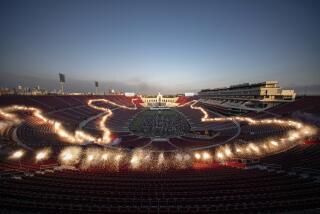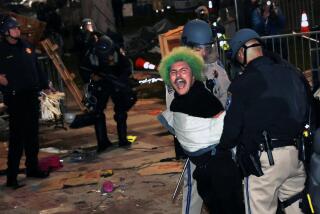LAPD defends, critics condemn use of projectiles on unruly Super Bowl revelers
- Share via
- Share via
When Los Angeles police officers moved in to disperse rowdy Super Bowl revelers in downtown L.A. on Sunday night, they did so using a controversial weapon: hard-foam projectile launchers.
At least nine times over the course of several hours, officers fired the weapons as they chased unruly celebrators through the streets and broke up gatherings where people were setting off fireworks and vandalizing city buses.
LAPD Chief Michel Moore defended the use of the weapons Tuesday, telling the department’s civilian oversight panel they were necessary to deal with individuals who posed threats to officers’ safety. To fire the foam projectiles, officers must be faced with such threats according to the terms of a recent federal injunction restricting their use.
“Our officers responded in, I believe, a very measured and orderly fashion,” Moore told the panel.
Critics disagreed.
“They seemed to be way outside of the parameters of the injunction,” said Melina Abdullah, a leader of Black Lives Matter Los Angeles, which won the court ruling in an ongoing lawsuit over the LAPD’s response to protests in 2020. “The injunction has not stopped them from approaching things — I guess not just protesters, but in this case celebrants of the Super Bowl — just violently.”
Sunday’s post-Super Bowl revelry was the largest test of the LAPD’s crowd control tactics since its officers badly injured people with projectiles during mass protests over George Floyd’s murder in the spring of 2020, celebrations for the Lakers and Dodgers championship wins that fall and protests over the clearing of a homeless encampment at Echo Park that winter.
Those clashes helped spur not just the Black Lives Matter lawsuit, but a new state law that requires increased training for law enforcement officers and prohibits them from aiming foam projectiles at the head, neck or other vital organs. The LAPD also revised its own policies.
In May, U.S. District Judge Consuelo B. Marshall issued a preliminary injunction in the lawsuit that requires that 37-millimeter projectiles only be fired at the ground in front of protesters after police have declared a gathering unlawful, and never directly at people “unless absolutely necessary to prevent imminent serious bodily injury to the officer or others.”
Marshall ruled that 40-millimeter rounds could only be used to target people “when the officer reasonably believes that a suspect is violently resisting arrest or poses an immediate threat of violence or physical harm,” and must not be aimed at the head, neck, kidneys, chest, groin or spine.
The injunction did not apply to beanbag projectiles, but in late September, LAPD Chief Michel Moore barred their use for crowd control.
In response to questions about Sunday’s use of the weapons from The Times, Capt. Stacy Spell, a LAPD spokesman, said in a statement that officers fired a total of four 37-millimeter hard foam rounds and five 40-millimeter hard foam rounds.
He said all of the shots were fired in accordance with the injunction, and that the department was not aware of any injuries caused by the projectiles that were fired.
Spell said that each of the 37-millimeter rounds was fired at the ground by a trained officer from the LAPD’s specialized Metropolitan Division, in order to “disperse people in the crowd who threw projectiles at the officers” near the intersection of 11th and Hope streets.
A Times reporter witnessed officers firing some of those shots in the direction of a large, fleeing crowd.
Moore told the Police Commission on Tuesday that the five 40-millimeter rounds were aimed at “people who posed an aggressive and violent response” to officers trying to clear crowds. He did not elaborate.
Moore said police supervisors were reviewing video of the shootings from cameras worn by officers.
Carol Sobel, an attorney for BLM who has repeatedly sued the LAPD over the use of projectile weapons going back decades, said the response Sunday night — which she saw video of online — again raised concerns.
Sobel said firing at people in fleeing crowds has in the past led to people being badly wounded, including individuals who police acknowledged were not their targets.
“It is a serious problem if you’re shooting potentially lethal — they call them ‘less lethal,’ which means they’re still lethal — randomly into a crowd,” Sobel said. “You wouldn’t do that with live ammunition.”
Sobel also said the LAPD appeared to use the weapons “as a first resort,” which was “a real problem.”
Abdullah, who also saw video from the scene, said officers opened fire at crowds that “didn’t seem to be posing a serious threat of harm to police or others,” in violation of the injunction. She said that, even if fireworks were being set off in dangerous ways, that doesn’t make it right for officers to fire equally dangerous projectiles.
“The police shouldn’t be causing greater threat of harm,” Abdullah said.
More to Read
Sign up for Essential California
The most important California stories and recommendations in your inbox every morning.
You may occasionally receive promotional content from the Los Angeles Times.












